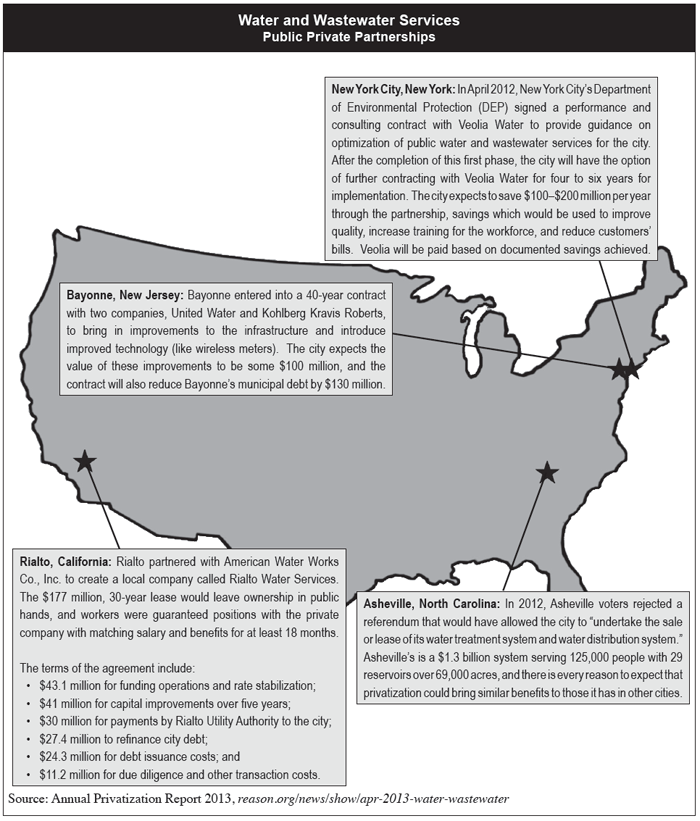Fresh Water and Wastewater Services
Recommendations
North Carolina city and county water and wastewater services should be contracted to private firms or converted into privately owned services.
Background
Privatizing water and wastewater services is not a radical idea. Local governments all over the country have either privatized their systems altogether or entered into public-private partnerships to provide these services.
|
Many of North Carolina communities' problems with fresh water and wastewater services could be solved by privatization. The drought of 2007 caused several communities to place strict controls, enforced with $1,000 fines, on how citizens used water. This exclusive focus on reducing demand through coercion diverted the public's attention away from government failures to price water properly (in order to manage demand voluntarily) and plan for adequate supply. Local governments often respond to political incentives and set prices well below market rates, which inevitably leads to shortages. Private ownership creates incentives to price water based on market forces — including a temporary scarcity of water owing to drought — and to avoid shortages.
Citizens have also experienced serious contamination of fresh water from government wastewater systems. For example, Wilmington was forced to close swimming and fishing areas when four million gallons of untreated sewage went into Hewletts Creek. Cary had similar problems when millions of gallons in raw sewage contaminated Swift Creek, causing the closure of Lake Wheeler and Lake Benson. With privatization, such problems are less frequent. Private companies facing competition for government contracts have additional incentives to act responsibly and prevent contamination.
Analysis
The U.S. Clean Water Act requires cities and counties to install costly equipment to prevent water pollution. The Environmental Protection Agency (EPA) suggests privatization for cities to meet this federal mandate because of the increased efficiency of private-sector firms. In many cases, areas that have chosen this path have even seen private firms surpass EPA standards.
Privatization contracts often include cost, quality, and customer service criteria to which private servers must adhere in order to maintain their contracts. With public water operations, citizens have fewer guarantees of those criteria. A city whose public water system is inefficient faces few consequences. A private supplier that is inefficient or endangers water quality, however, risks losing its contract. For these reasons, citizens benefit greatly from the privatization of water.
Should we trust the private sector?
The profits of private water companies are contingent on their maintenance of high levels of safety. Many other indispensible goods, including food and medicine, are well provided through the private sector. People trust that, with government oversight and private companies' incentives to maintain a positive image, those goods will be safe. Private water service is no different.
How do local officials maintain control and accountability of private providers?
Public officials can easily write water and wastewater contracts that specify measurable performance standards by which those officials can monitor private firms. By providing compensation only when the contract firms meet their standards, local governments are able to maintain a high level of control over the water supply. The contracts can include both safety and quality terms, as well as be flexible to communities’ particular needs.
Private water systems have incentives to deliver high-quality services at competitive prices.

Analyst: Julie Gilstrap
Research Publications Coordinator
919-828-3876 • jgilstrap@johnlocke.org
The entire 2014 City & County Issue Guide, is available for download as a 3.6MB Adobe Acrobat file.
The free Adobe Acrobat Reader is required to view or print this document.
| 

